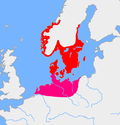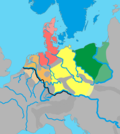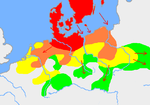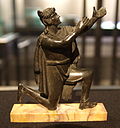Latin characters. Proto-Germanic (abbreviated PGmc; also called Common Germanic) is the reconstructed proto-language of the Germanic branch of the Indo-European...
130 KB (12,136 words) - 10:03, 15 September 2024
Proto-North Germanic) was an Indo-European language spoken in Scandinavia that is thought to have evolved as a northern dialect of Proto-Germanic in the first...
22 KB (2,290 words) - 16:07, 13 July 2024
from Proto-Germanic, spoken in Iron Age Scandinavia, Iron Age Northern Germany and along the North Sea and Baltic coasts. The West Germanic languages include...
93 KB (9,521 words) - 15:43, 9 October 2024
The West Germanic languages constitute the largest of the three branches of the Germanic family of languages (the others being the North Germanic and the...
56 KB (4,772 words) - 11:51, 2 October 2024
The Germanic parent language (GPL), also known as Pre-Germanic Indo-European (PreGmc) or Pre-Proto-Germanic (PPG), is the stage of the Germanic branch...
11 KB (1,249 words) - 18:46, 12 July 2024
the Ingvaeonic languages can be divided into two groups, those being changes that occurred after the split from Proto-Northwest-Germanic (Ingvaeonic B)...
8 KB (910 words) - 21:34, 30 August 2024
of Proto-Germanic grammar, as inherited from Proto-Indo-European grammar. All reconstructed forms are marked with an asterisk (*). Proto-Germanic had...
60 KB (6,141 words) - 23:44, 4 October 2024
Proto-Germanic paganism was the beliefs of the speakers of Proto-Germanic and includes topics such as the Germanic mythology, legendry, and folk beliefs...
72 KB (1,709 words) - 20:31, 8 July 2024
and proto-languages. North Sea Germanic Weser–Rhine Germanic Stefan Müller, Germanic syntax: A constraint-based view, series: Textbooks in Language Sciences...
6 KB (485 words) - 02:34, 10 September 2024
East Germanic languages, also called the Oder-Vistula Germanic languages, are a group of extinct Germanic languages that were spoken by East Germanic peoples...
9 KB (918 words) - 17:06, 6 October 2024
is not enough evidence for the sound.: 107 The Proto-Germanic */z/ is also preserved in the language as a sibilant (always found written ⟨s⟩ or as part...
32 KB (2,185 words) - 17:24, 15 October 2024
alternation is the English plural foot ~ feet (from Proto-Germanic *fōts, pl. *fōtiz). Germanic umlaut, as covered in this article, does not include...
54 KB (5,427 words) - 08:54, 18 October 2024
branches: East Germanic languages North Germanic languages West Germanic languages They all descend from Proto-Germanic, and ultimately from Proto-Indo-European...
15 KB (1,110 words) - 20:32, 12 June 2024
The North Germanic languages make up one of the three branches of the Germanic languages—a sub-family of the Indo-European languages—along with the West...
57 KB (5,452 words) - 18:17, 22 September 2024
The Germanic language family is one of the language groups that resulted from the breakup of Proto-Indo-European (PIE). It in turn divided into North,...
29 KB (2,932 words) - 15:14, 15 October 2024
boxes, or other symbols instead of letters. Gothic is an extinct East Germanic language that was spoken by the Goths. It is known primarily from the Codex...
91 KB (10,144 words) - 11:24, 9 October 2024
of the Germanic languages List of ancient Germanic peoples and tribes Germanic languages Proto-Germanic language, a reconstructed proto-language of all...
797 bytes (121 words) - 17:25, 11 December 2021
Continental Germanic mythology. It was a key element of Germanic paganism. As the Germanic languages developed from Proto-Indo-European language, Germanic mythology...
9 KB (973 words) - 19:50, 30 July 2024
Elfdalian (redirect from Elfdalian language)
(Proto-Germanic *an), sją̊ "to see" (Proto-Germanic *sehwaną), tųo "two (accusative)" (Proto-Germanic *twanz) and the prefix ųo- "un-" (Proto-Germanic...
40 KB (3,532 words) - 21:34, 9 October 2024
later Germanic peoples, and is often supposed to have been the culture in which the Germanic Parent Language, the predecessor of the Proto-Germanic language...
163 KB (20,237 words) - 17:01, 17 October 2024
century AD. Modern Celtic languages include Welsh, Cornish, Breton, Scottish Gaelic, Irish and Manx. Germanic (from Proto-Germanic), earliest attestations...
112 KB (10,257 words) - 03:40, 14 October 2024
A-mutation is a metaphonic process supposed to have taken place in late Proto-Germanic (c. 200). In a-mutation, a short high vowel (*/u/ or */i/) was lowered...
12 KB (1,525 words) - 05:00, 27 April 2024
it claims that Proto-Germanic may have been either a creole or a contact language that subsumed a non-Indo-European substrate language, or a hybrid of...
19 KB (2,088 words) - 01:09, 20 September 2024
[ð] but, in most sources discussing Proto-Germanic, it is spelled ⟨d⟩ by convention. In the West Germanic languages, the suffix hardened to [d], but it...
60 KB (5,115 words) - 22:38, 29 June 2024
Verner's law (category Articles containing Proto-Germanic-language text)
characters. Verner's law describes a historical sound change in the Proto-Germanic language whereby consonants that would usually have been the voiceless fricatives...
20 KB (2,176 words) - 00:05, 8 August 2024
'holiness'. Another Proto-Germanic masculine noun *lauhaz, has given rise to words with a variety of meanings in various Germanic languages, including Anglo-Saxon...
17 KB (1,594 words) - 11:57, 2 May 2024
Rune (redirect from Germanic rune)
from Proto-Germanic, and the source of the term for rune, riimukirjain, meaning 'scratched letter'. The root may also be found in the Baltic languages, where...
68 KB (6,974 words) - 01:01, 17 October 2024
Grimm's law (redirect from First Germanic sound shift)
First Germanic Sound Shift or Rask's rule, is a set of sound laws describing the Proto-Indo-European (PIE) stop consonants as they developed in Proto-Germanic...
22 KB (1,692 words) - 09:37, 17 September 2024
of historical linguistics, a proto-language is a postulated ancestral language from which a number of attested languages are believed to have descended...
13 KB (1,688 words) - 09:32, 26 September 2024
before the proto-Finnic era. Often quoted loan examples are kuningas 'king' and ruhtinas 'sovereign prince, high ranking nobleman' from Germanic *kuningaz...
96 KB (9,272 words) - 07:08, 13 October 2024













